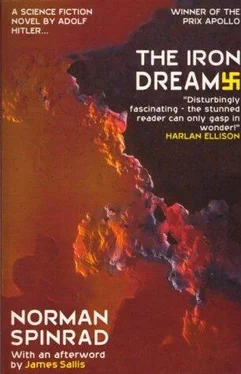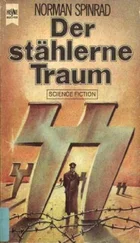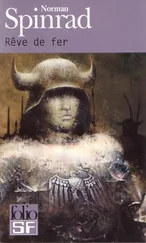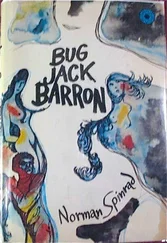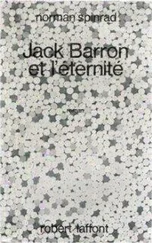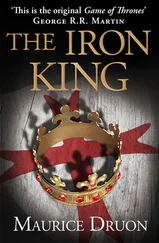Norman Spinrad - The Iron Dream
Здесь есть возможность читать онлайн «Norman Spinrad - The Iron Dream» весь текст электронной книги совершенно бесплатно (целиком полную версию без сокращений). В некоторых случаях можно слушать аудио, скачать через торрент в формате fb2 и присутствует краткое содержание. Год выпуска: 1999, ISBN: 1999, Издательство: Toxic, Жанр: Фантастика и фэнтези, на английском языке. Описание произведения, (предисловие) а так же отзывы посетителей доступны на портале библиотеки ЛибКат.
- Название:The Iron Dream
- Автор:
- Издательство:Toxic
- Жанр:
- Год:1999
- ISBN:1-902002-16-4
- Рейтинг книги:4 / 5. Голосов: 1
-
Избранное:Добавить в избранное
- Отзывы:
-
Ваша оценка:
- 80
- 1
- 2
- 3
- 4
- 5
The Iron Dream: краткое содержание, описание и аннотация
Предлагаем к чтению аннотацию, описание, краткое содержание или предисловие (зависит от того, что написал сам автор книги «The Iron Dream»). Если вы не нашли необходимую информацию о книге — напишите в комментариях, мы постараемся отыскать её.
Lord of the Swastika
The Iron Dream — читать онлайн бесплатно полную книгу (весь текст) целиком
Ниже представлен текст книги, разбитый по страницам. Система сохранения места последней прочитанной страницы, позволяет с удобством читать онлайн бесплатно книгу «The Iron Dream», без необходимости каждый раз заново искать на чём Вы остановились. Поставьте закладку, и сможете в любой момент перейти на страницу, на которой закончили чтение.
Интервал:
Закладка:
And if this were not enough, consider the astonishing fact that not a single woman appears as a character in the book. It may be fairly said that asexuality is a hallmark of the typical science-fantasy novel; women appear only as chaste stock figures, token romantic interest for the hero, prizes to be won. However, Lord of the Swastika not only lacks this traditional romantic interest, it goes to incredible lengths to deny the very need for the female half of the human race. Finally, all reproduction is to proceed from the cloning of the all-male SS, a weird sort of male parthenogenesis. <
It is tempting to add this denial of the very existence of women to the phallic fetishism and come up with a diagnosis of repressed homosexuality on the part of Hitler. It is true that although Hitler never married, he had a certain reputation as a Don Juan at science-fiction conventions.
On the other hand, repressed homosexuality is frequently an element in Don Juanism. Nevertheless it would be somewhat presumptuous to make such a post-mortem diagnosis from the available evidence. Suffice it to say that Hitler’s attitude toward women and sexuality was hardly wholesome.
Thus, far from a cynically written formula novel cunningly devised to appeal to the phallic urges of the masses like so many other science-fantasy novels, Lord of the Swastika emerges as the obsessional product of a deranged but powerful personality. Its power derives not from the skill of the writer but from the very richness of the pathological self-display with which he invested the novel in an entirely unselfconscious manner. It is well known that the art of psychotics may appear as brilliant and appealing even to the perfectly normal mind. Such art gives us a frightening glimpse into a baleful reality fortunately beyond our personal experience. Thus we come away deeply moved and disturbed by intimate contact with the unspeakable.
Those unfamiliar with the commercial science-fiction genre may be startled to learn that such pathological products are not that uncommon. The literature of science fiction abounds with stories of all-powerful phallic supermen, alien creatures rendered as fecal surrogates, penile totems, vaginal castration symbols (such as the monster with the many sucking mouths filled with razor-sharp teeth in Swastika), subliminally homoerotic or even pederastic relationships, and the like. While a few of the better writers in the field make sparing and judicious use of such elements on a conscious level, most of this material bubbles up from the subconscious into the work of writers writing on a purely superficial surface level.
Lord of the Swastika varies only in intensity and to some extent in content from the considerable body of pathological literature published within the science-fiction field. One must look to Hitler’s somewhat unusual background to fully explain the unique appeal of this particular book.
Adolf Hitler was born an Austrian and migrated to Germany, in whose army he served during the Great War, before emigrating to New York in 1919. During the period between the end of the Great War and his move to America, Hitler was involved with a small radical party known as the National Socialists. Very little is known about this obscure group which disappeared around 1923, a full seven years before the Communist coup made the subject academic. However it does seem clear that the National Socialists, or Nazis, as they were sometimes called, anticipated the machinations of the Soviet Union by many years and were confirmed anti-Communists.
The subject of the National Socialists and Germany remained sore points with Hitler for the rest of his life; he discussed them only with great reluctance and bitterness and, as it were, in his cups. The National Socialists he dismissed, no doubt with entirely sufficient justification, as a pathetic beer-hall debating society. But his early, fiery, and continuing devotion to the cause of anti-Communism was well-known, and involved him in many heated debates and feuds within the small world of science-fiction fans in which he moved, until the takeover of Britain in 1948 made the imperialistic appetite of the Greater Soviet Union crystal clear to even the most naive Communist apologist.
Thus, while the imagery, violence, fetishism, and symbolism of Lord of the Swastika are clearly manifestations of Hitler’s unwholesome unconscious obsessions, it is reasonable to assume that elements of political allegory within the novel were conscious creations on Hitler’s part, and products of a mind deeply concerned with world politics and the unhappy fate of his ancestral Europe.
The Empire of Zind bears obvious similarities to the present-day Greater Soviet Union. Zind represents the logical extreme end-product of Communist ideology—an anthill of mindless slaves presided over by a ruthless oligarchy. As the Dominators of Zind seek a world in which every sapient being has been reduced to their subhuman slave, so the present Communist leaders seek a world in which individualism will be entirely annihilated and every man reduced to subservience to the Communist Party of the GSU. As the power of Zind resides in its great size and huge pool of manpower which the Dominators feel free to expend without humanitarian scruples, so does the power of the Greater Soviet Union derive from its vast extent and enormous population, which the Communists tax cruelly with total disregard for individual need or dignity.
Heldon would seem to represent some resurgent Germany that never existed, a wish-fulfillment on Hitler’s part, or possibly the non-Communist world in toto .
Beyond this, the political allegory seems hopelessly muddled. The Dominators seem to stand for the world Communist movement; in the novel, the “Universalist Party” seems a straightforward surrogate for the Communist Party, with its base and cynical appeal to the sloth of the lower classes.
Yet there seems to be something more to it, something bound up with the entirely inexplicable genetic obsessions of the novel. It is impossible to draw any viable parallel between the degenerated mutants that infest the world of Lord of the Swastika and anything in contemporary reality. Of course the world of Swastika is the product of an ancient atomic war; perhaps Hitler’s depiction of the genetically deformed descendants of our own age is simply a cautionary note. But the Doms themselves seem to be a genuine paranoid element. It is hard to escape the conclusion that they stand for some real or imagined group that Hitler hated and feared.
There is some flimsy evidence that the Nazi Party was to a certain extent anti-Semitic. Thus there is the temptation to conclude that the Dominators are somehow symbolic of the Jews. But since Zind is obviously meant to stand for the Greater Soviet Union, in which anti-Semitism has reached such rabid heights in the past decade that five million Jews have perished, and since the Dominators, far from being the victims of Zind, are its absolute rulers, this notion falls flat on its face.
Despite the confusion in details, however, the fundamental political allegory of Lord of the Swastika is quite clear: Heldon, representing either Germany or the non-Communist world, totally annihilates Zind, representing the Greater Soviet Union.
Needless to say, this particular political wish-fulfillment fantasy strikes a chord in the heart of every American at a time when only the United States and Japan stand between the Greater Soviet Union and total control of the globe. Further, the manner of victory also appeals to our deepest desires. Heldon destroys Zind without recourse to nuclear weapons. The heroic individualism of Heldon defeats the mindless hordes of Zind, i.e., the free men of the non-Communist world defeat the slave masses of Communized Eurasia. Only the loathsome Dominators, the Communist surrogates, stoop to the use of nuclear weapons and it avails them nothing. Although such an outcome to the present bleak world situation seems impossible, it cannot be denied that it represents our fondest hope for world peace through world freedom.
Читать дальшеИнтервал:
Закладка:
Похожие книги на «The Iron Dream»
Представляем Вашему вниманию похожие книги на «The Iron Dream» списком для выбора. Мы отобрали схожую по названию и смыслу литературу в надежде предоставить читателям больше вариантов отыскать новые, интересные, ещё непрочитанные произведения.
Обсуждение, отзывы о книге «The Iron Dream» и просто собственные мнения читателей. Оставьте ваши комментарии, напишите, что Вы думаете о произведении, его смысле или главных героях. Укажите что конкретно понравилось, а что нет, и почему Вы так считаете.
